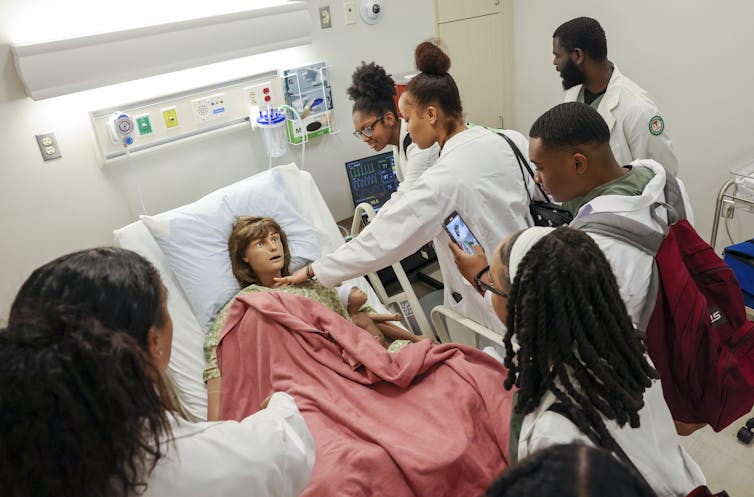Colleges teach the most valuable career skills when they don’t stick narrowly to preprofessional education
- Written by Daniel V. McGehee, Professor of Industrial and Systems Engineering, University of Iowa
 Tracking graduates’ earnings is just one way to measure the benefit of higher education.iStock/Getty Images Plus
Tracking graduates’ earnings is just one way to measure the benefit of higher education.iStock/Getty Images PlusAcross state legislatures and in Congress, debates are intensifying about the value of funding certain college degree programs – and higher education, more broadly.
The growing popularity of professional graduate degrees over the past several decades – including programs in business administration and engineering management – has reshaped the economics of higher education. Unlike traditional academic graduate programs, which are often centered on research and scholarship, these professionally oriented degrees are designed primarily for workforce advancement and typically charge much higher tuition.
These programs are often expensive for students and are sometimes described as cash-cow degrees for colleges and universities, because the tuition revenue far exceeds the instructional costs.
Some universities and colleges also leverage their brands to offer online, executive or certificate-based versions of these programs, attracting many students from the U.S. and abroad who pay the full tuition. This steady revenue helps universities subsidize tuition for other students who cannot pay the full rate, among other things.
Yet a quiet tension underlies this evolution in higher education – the widening divide between practical, technical training and a comprehensive education that perhaps is more likely to encourage students to inquire, reflect and innovate as they learn.
An overlooked factor
Some states, including Texas, track salary data for graduates of every program to measure worth through short-term earnings. This approach may strike many students and their families as useful, but I believe it overlooks a part of what makes higher education valuable.
A healthy higher education system depends not only on producing employable graduates but also on cultivating citizens and leaders who can interpret uncertainty, question assumptions and connect ideas across disciplines.
When assessing disciplines such as English, philosophy, history and world languages, I think that we should acknowledge their contributions to critical thought, communication and ethical reasoning.
These academic disciplines encourage students to synthesize ideas, construct arguments and engage in meaningful debate. Some law schools often draw their strongest students from these backgrounds because they nurture analytical and rhetorical skills essential for navigating complex civic and legal issues.
Historically, poets and writers have often been among the first to be silenced by authoritarian regimes. It’s a reminder of the societal power of inquiry and expression that I believe higher education should protect.
 Undergraduate students who want to become doctors or work in other specialized fields are often encouraged to take only classes that connect with their long-term career trajectory.Glenn Beil/Florida A&M University via Getty Images
Undergraduate students who want to become doctors or work in other specialized fields are often encouraged to take only classes that connect with their long-term career trajectory.Glenn Beil/Florida A&M University via Getty ImagesWhy students stay on narrow professional paths
Students entering college today face significant pressure to choose what they might see as safe majors that will result in a well-paying career. For aspiring physicians and engineers, the path is often scripted early by steering them toward physical and biosciences. High test scores, internships and other stepping stones are treated as nonnegotiable. Parents and peers can reinforce this mindset.
Most colleges and universities do not reward a future medical student who wants to major in comparative literature, or an engineering student who is spending time on philosophy.
Students’ majors also typically place course requirements on them, in addition to a school’s general course requirements. This often does not leave a lot of room for students to experiment with different classes, especially if they are pursuing vocationally focused majors, such as engineering.
As a result, I’ve seen many students trade curiosity for credentialing, believing that professional identity must come before intellectual exploration.
As someone who began my education in psychology and later transitioned into engineering, I have seen how different intellectual traditions approach the same human questions. Psychology teaches people to observe behavior and design experiments. Engineering trains students to model systems and optimize performance.
When combined, they help reveal how humans interact with technology and how technological solutions reshape human behavior.
In my view, these are questions neither field can answer alone.
Initiative is the missing ingredient
One of the most important and often overlooked ingredients in thriving high tech, medical and business environments is initiative. I believe students in the humanities routinely practice taking initiative by framing questions, interpreting incomplete information and proposing original arguments. These skills are crucial for scientific or business innovation, but they are often not emphasized in structured science, technology, engineering and mathematics – or STEM – coursework.
Initiative involves the willingness to move first and to see around corners, defining the next what-if, rallying others and building something meaningful even when the path is uncertain.
To help my engineering students practice taking initiative, I often give them deliberately vague instructions – something they rarely experience in their coursework. Many students, even highly capable ones, hesitate to take initiative because their schooling experience has largely rewarded caution and compliance over exploration. They wait for clarity or for permission – not because they lack ability, but because they are afraid to be wrong.
Yet in business, research labs, design studios, hospitals and engineering firms, initiative is the quality employers most urgently need and cannot easily teach. Broader educational approaches help cultivate this confidence by encouraging students to interpret ambiguity rather than avoid it.
How teaching can evolve
Helping all students develop a sense of initiative and innovation requires university leaders to rethink what success looks like.
Universities can begin with achievable steps, such as rewarding cross-disciplinary teaching and joint appointments in promotion and tenure criteria.
At the University of Iowa’s Driving Safety Research Institute, where our teams blend engineering, medicine, public health and psychology, students quickly learn that a safe automated vehicle is not just a technical system but also a behavioral one. Understanding how human drivers respond to automation is as important as the algorithms that govern the vehicle.
Other institutions are modeling this approach of integrating social, behavioral and physical sciences.
Olin College of Engineering, a school in Needham, Massachusetts, builds every project around both technical feasibility and human context. Courses are often co-taught by humanities and engineering professors, and projects require students to articulate not only what they built but why it matters.
Still, integrating liberal and technical education is difficult in practice. Professional curricula often overflow with accreditation requirements. Faculty incentives reward specialization more than collaboration. Students and parents, anxious about debt and job security, hesitate to spend credits outside of a student’s major.
Rethinking what success means
I believe that higher education’s purpose is not to produce uniform workers but adaptable thinkers.
It might not be productive to center conversations about defending the liberal arts or glorifying STEM. Rather, I think that people’s focus should be on recognizing that each field is incomplete without the other.
Education for a complex world must cultivate depth, initiative and perspective. When students connect disciplines, question assumptions and act with purpose, they are prepared not only for their first job but for a lifetime of learning and leadership.
Daniel V. McGehee does not work for, consult, own shares in or receive funding from any company or organization that would benefit from this article, and has disclosed no relevant affiliations beyond their academic appointment.
Authors: Daniel V. McGehee, Professor of Industrial and Systems Engineering, University of Iowa

